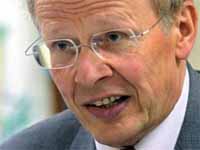UN envoy in Afghanistan says Talibanization poses threat to Pakistan
The top U.N. diplomat in Afghanistan said Monday that Talibanization posed a threat to the region, particularly neighboring Pakistan, and warned that the hardline group's rule was not an experience worth repeating.

Tom Koenigs, the U.N. special representative to Afghanistan, also criticized a senior Pakistani official who last week likened the Taliban resistance to a nationalist struggle against foreign forces.
There is "a danger of Talibanization of the region ... particularly of Pakistan," Koenigs told reporters. "Other states should look at this experience (of Afghanistan) and make it very clear that they don't want to repeat this experience."
The Taliban ruled Afghanistan with an iron fist from 1996-2001, and was accused of widespread human rights violations and repression of women. Over the past year, their militant supporters have staged a military comeback, threatening the elected government in Afghanistan.
Pro-Taliban militants have also gained sway in Pakistan's tribal belt along the Afghan border, raising fears of a wider "Talibanization" of the region.
Koenigs said that some Pakistani politicians and officials were underestimating the Taliban's threat to international peace and security, just as the international community did when the Taliban first rose to power in the 1990s.
On Friday, Ali Mohammed Jan Aurakzai, the governor of Pakistan's North West Frontier Province which includes areas where Taliban and al-Qaida militants fled after the 2001 war that ousted the hardline regime claimed that ethnic Pashtuns in Afghanistan were increasingly supporting the Taliban, amid frustration over lack of influence in government and insufficient economic aid.
Aurakzai also said the support for militant operations in Afghanistan had developed into a nationalist resistance, a "liberation war against coalition forces."
"I have read the statements of Governor Aurakzai and I was very astonished," Koenigs said. "I think the Pakistani government has to clarify whether this is its official position or whether it is the position of a governor who should be corrected by the central government."
Koenigs also criticized Fazlur Rehman, the leader of an opposition Islamic party in Pakistan, for his pro-Taliban stance. Rehman's party leads the local government in North West Front Province, reports AP.
Afghanistan and some Western diplomats have accused Pakistan of allowing insurgents and Taliban elements to seek refuge and train on its soil. Pakistan, a key ally in the U.S.-led war on terror, says it does what it can to stop them and says most of the militants hail from Afghanistan.
Subscribe to Pravda.Ru Telegram channel, Facebook, RSS!




